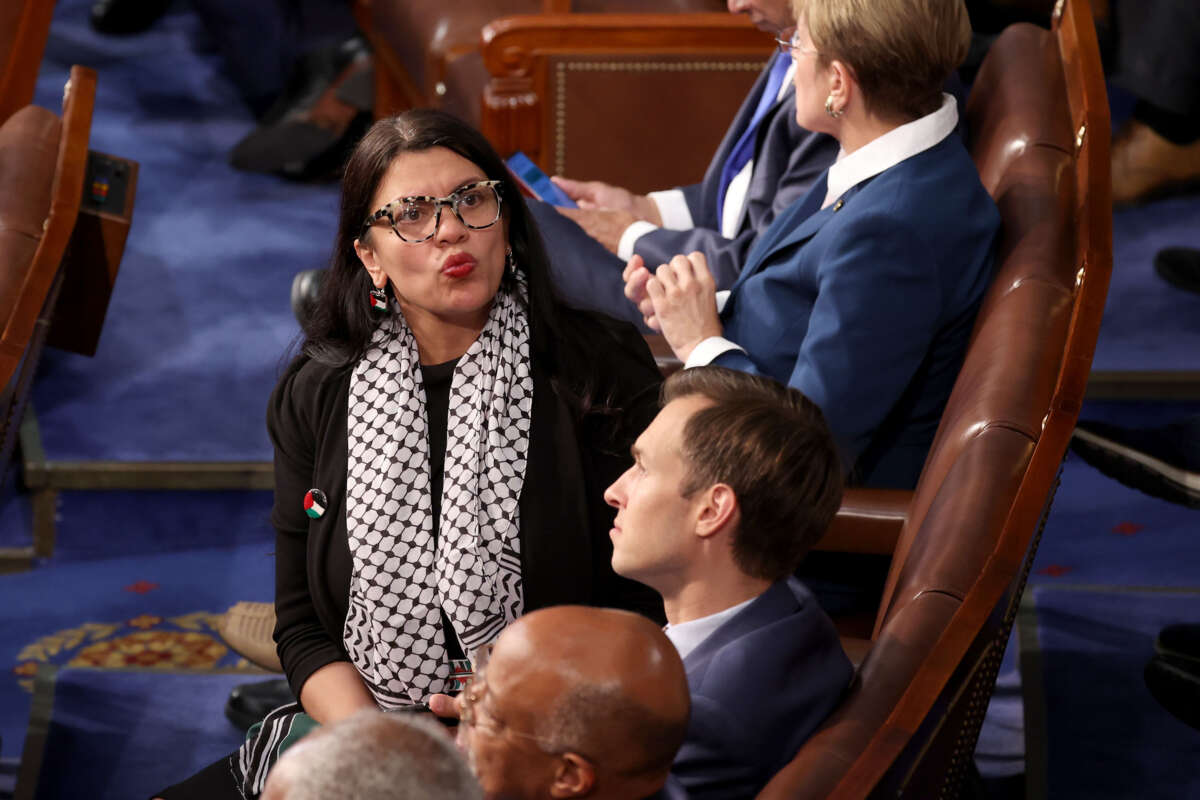Truthout is an indispensable resource for activists, movement leaders and workers everywhere. Please make this work possible with a quick donation.
Rep. Rashida Tlaib (D-Michigan) has reiterated the call for an arms embargo on Israel, as Israeli forces continue killing Palestinians in Gaza despite the ceasefire agreement mandating an end to hostilities.
“The Israeli government will never stop until we make them with an arms embargo,” the Palestinian American lawmaker said on social media on Thursday.
Like Tlaib, numerous groups for Palestinian rights have highlighted the importance of continuing to push for an arms embargo with the ceasefire in place, calling it a crucial step toward finally putting an end to Israel’s decades of violent dispossession of and apartheid against Palestinians.
“As Americans, we understand that the Israeli genocide has been carried out with U.S. bombs, U.S. funds, and U.S.-facilitated impunity — we continue to demand a full weapons embargo now. We also demand an end to the complicity of corporations that profit from genocide,” said Jewish Voice for Peace in a statement on the ceasefire last week.
“Left in the hands of the U.S. and Israeli governments, weapons manufacturers, and warmongering institutions, this fragile respite will not mean an end to Israeli genocide or to the violent status quo of Israeli apartheid,” the group said.
As the first phase of the ceasefire has gone into effect in Gaza, Israel’s massacres have slowed significantly, down from dozens or hundreds of reported killings each day for over 460 days since October 7, 2023.
But the slaughter hasn’t stopped. On Thursday, Tlaib reposted news that an Israeli strike that day had killed two Palestinians in southern Gaza.
They are among numerous Palestinians who Israel has killed during the ceasefire. This includes children like Zakariya Hameed Yahya Barbakh, a 15-year-old shot and killed in Rafah by an Israeli sniper on Monday, the day after the ceasefire went into effect. Video footage of the incident shows soldiers then shooting at a man who went to help the child.
Israel has claimed that its soldiers were firing at Hamas forces, an explanation that the military has trotted out time and again throughout its genocide.
These violations of the ceasefire come amid an extremely fraught time. According to the agreement signed last week, the first phase of the ceasefire lasts six weeks and mandates the end of attacks and the gradual withdrawal of Israeli troops to designated areas. Israel is supposed to allow 600 trucks of humanitarian aid into Gaza a day.
Also as part of the deal, Israel and Hamas swapped captives over the weekend, with Hamas releasing three Israelis of the roughly 100 in Gaza and Israel releasing 90 of the over 10,000 Palestinian detainees imprisoned in Israeli jails and torture camps.
However, Israel has still been killing Palestinians in Gaza — and, while Israel is seemingly complying with the surge of humanitarian aid, groups have repeatedly warned that the humanitarian operation may crumble when Israel’s ban on the UN Relief and Works Agency for Palestine Refugees (UNRWA) goes into effect next week.
Further, the military detained dozens of Palestinians after releasing 90 of them in the first swap, with some counts showing that the number of Palestinians detained in the first few days after the swap already exceeded the number of people released.
Meanwhile, just as the ceasefire went into effect, Israel began carrying out a siege of Jenin in the occupied West Bank. That assault has killed 12 Palestinians so far and injured 40 others, while Israel has even further clamped down on Palestinians’ movement across the West Bank, with the number of Israeli checkpoints skyrocketing.
Though Israel has lowered the intensity of its attacks on Gaza, it’s possible that it may return to its previous pace of massacres at the end of the first phase. Israeli Prime Minister Benjamin Netanyahu has said that the ceasefire is temporary and that Israel may resume fighting if negotiations are not fruitful for continuing on to the second phase, which is supposed to start in March. He has cited former President Joe Biden and President Donald Trump as offering him assurances that Israel be allowed to resume its slaughter.
A terrifying moment. We appeal for your support.
In the last weeks, we have witnessed an authoritarian assault on communities in Minnesota and across the nation.
The need for truthful, grassroots reporting is urgent at this cataclysmic historical moment. Yet, Trump-aligned billionaires and other allies have taken over many legacy media outlets — the culmination of a decades-long campaign to place control of the narrative into the hands of the political right.
We refuse to let Trump’s blatant propaganda machine go unchecked. Untethered to corporate ownership or advertisers, Truthout remains fearless in our reporting and our determination to use journalism as a tool for justice.
But we need your help just to fund our basic expenses. Over 80 percent of Truthout’s funding comes from small individual donations from our community of readers, and over a third of our total budget is supported by recurring monthly donors.
Truthout has launched a fundraiser, and we have a goal to add 200 new monthly donors in the next 24 hours. Whether you can make a small monthly donation or a larger one-time gift, Truthout only works with your support.
